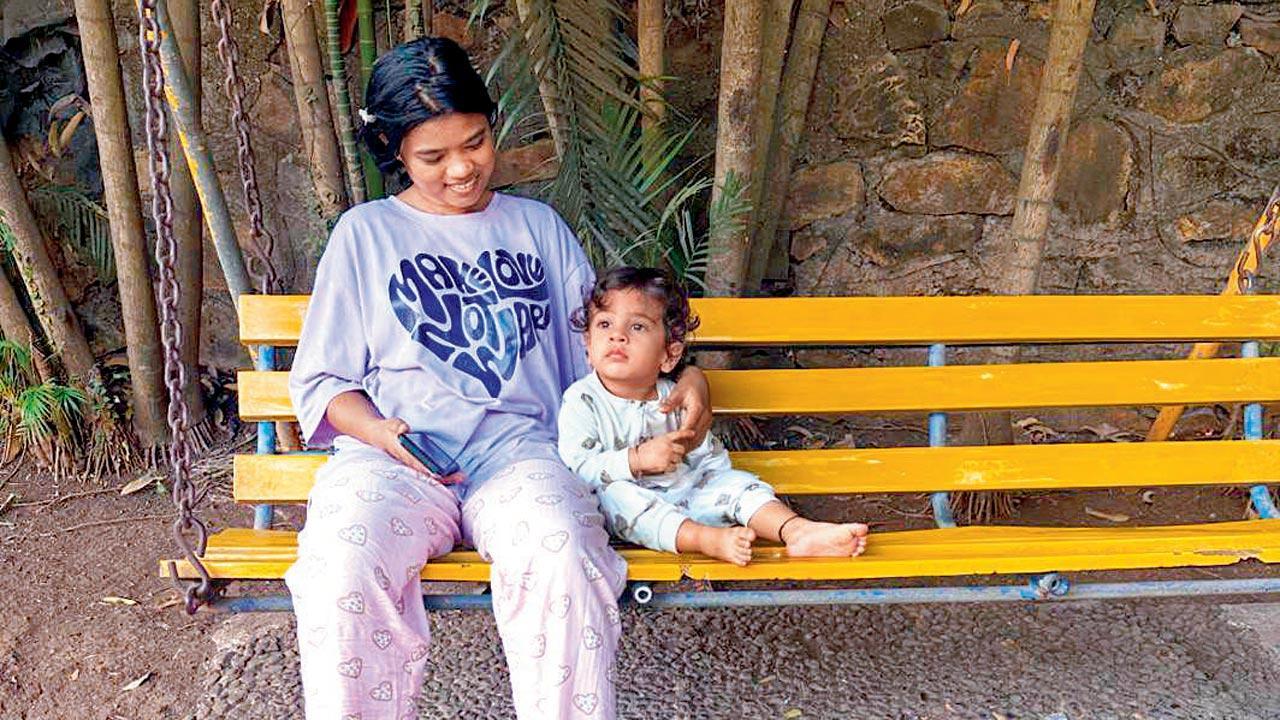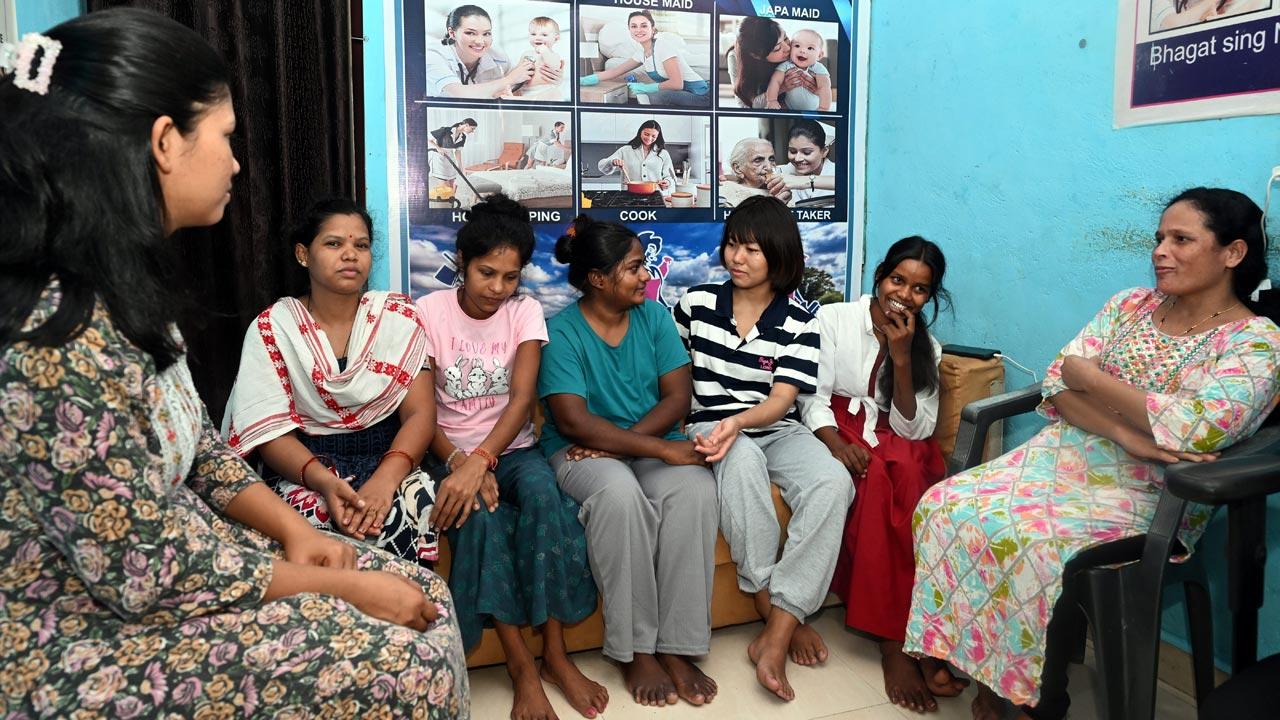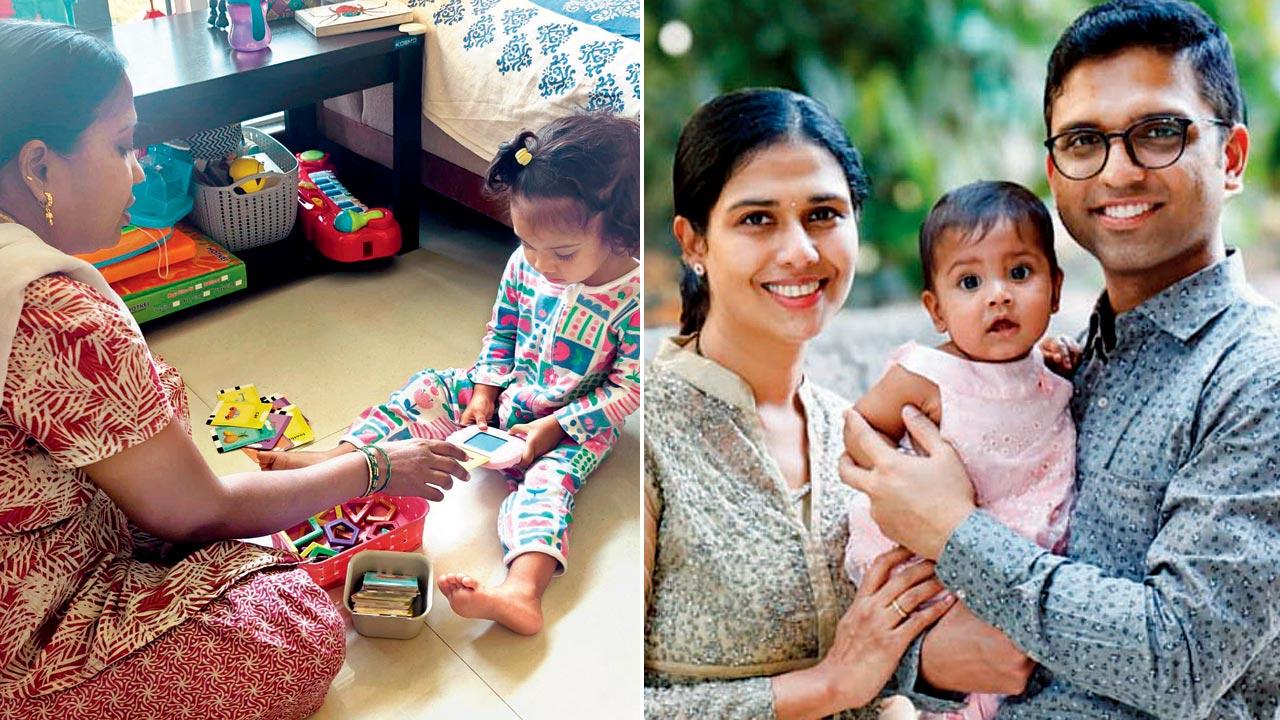For Mumbai’s nuclear families, the struggle to find nannies is real. With a lack of a reliable agencies and organised structure, how does one hire a trusted hand?

Tara Mani, Aariv Raisingh’s nanny, has been with him for over six months now
Two months after Aakanksha Singh’s parents left Mumbai for a trip abroad following the birth of her child, it became extremely difficult for her to manage her job and the baby by herself. Her husband’s two-week paternity leave had ended, and he had to work from the office five days a week.
ADVERTISEMENT
The Powai-based engineer had no choice but to look for a nanny. She was already part of several “moms’ WhatsApp groups”, so she posted a message asking for nanny recommendations, and the group, which included mothers from across Mumbai, sent dozens of suggestions for her area.
Until then she had relied on her mother, who had looked after her and her baby. But now, she had to teach a stranger everything from scratch.
 Nannies at Maids 24X7 Agency interact with each other at their office in Goregaon
Nannies at Maids 24X7 Agency interact with each other at their office in Goregaon
She wasn’t looking for a japa maid—this is a specialised caregiver who supports both mother and baby in the initial postpartum period, known as the japa period, using traditional methods including full baby care, post-delivery recovery massages and preparing nutritious meals to aid breastfeeding. “Luckily, my mother was with me in the early months. Now, I needed someone to help me as I returned to my routine,” says Singh, who works for a US-based auditing firm.
But never in her wildest dreams had Singh imagined that finding a nanny would take nearly six months. “Both my husband and I were sleeping less than four hours a day till we found a reliable hand,” she says.
Soon, she realised the problem was quite common, at least across Mumbai. Her friends, and people in the moms’ WhatsApp group, had to go through months of trial and error, hiring at least seven or eight nannies before finding the right one.
 Faiz ud-Din Hussain, the owner of Maids 24X7 Agency at his office. Pics/Satej Shinde
Faiz ud-Din Hussain, the owner of Maids 24X7 Agency at his office. Pics/Satej Shinde
She was surprised that even in India’s biggest and most advanced city, there is no organised structure for hiring nannies. India’s domestic help sector remains highly unregulated, with no central/state law or enforcement mechanism. No formal body or union exists to address issues like job retention, proper contracts, or fair wages. The closest thing to a formal body for domestic workers is The National Domestic Workers’ Movement (NDWM), but it focuses on protecting domestic workers’ rights rather than regulating the industry. And due to lack of education, most domestic workers remain unaware that such an organisation even exists.
As a result, this vast unorganised workforce is not only highly unreliable for nuclear families where both members work from offices, but also prone to exploitation and high costs.
No private companies offer reliable, long-term nanny services with proper contracts in India. We spoke to at least five agencies in Mumbai, all of which operate through personal references and word-of-mouth CVs. No state or national-level company provides such services reliably. Most are either local or hyperlocal, operating in just suburbs.
 Aakanksha Singh, engineer and mother of a one-year-old
Aakanksha Singh, engineer and mother of a one-year-old
The families we interviewed revealed that many agencies with flashy websites and apps are often fraudulent. Several mothers in Singh’s WhatsApp group confirmed they had been scammed by such services.
Sunday mid-day spoke to Varsha Singh of Shree Gauri Manpower, who has worked in this industry for over two decades. Currently the second-in-command at the Chandivli-based company, she has been a former nanny herself. She says, “This industry runs solely on trust. Both the nanny and the family must like each other. In many ways, it’s like dating because human relationships are involved. References from families are crucial—they can be written or oral.”
When asked how many people work with Shree Gauri Manpower, Varsha replied, “There’s no fixed number. We have worked with more than a thousand women in total over two decades. If someone comes with a strong reference from a good family, we verify them and help them secure new placements. We charge a one-month brokerage fee annually from the family, if the nanny stays for that period, and offer a 10-day free trial. We also verify the candidate’s Aadhaar number before approving them as a resident nanny.”
However, Faiz ud-Din Hussain, who runs Goregaon-based Maid 24X7, an agency providing domestic help for cleaning, cooking, and childcare, offers a different perspective: “Most women in this industry come from poor backgrounds, like many in the unorganised sector. Nannies from Odisha, Jharkhand, Chhattisgarh, and Assam are in high demand due to the reputation for good work that they have built over the years. Another reason for the demand is that their hometowns are far, so they can’t take leave frequently. But when they do visit home, they often overstay. Since there are no formal contracts and plenty of opportunities year-round, nannies with strong references sometimes abuse their leave privileges.”
On the business model, Hussain says, “Anyone can open this business.” The requirements are minimal: “Basic permissions for a space from BMC, fire hazard approvals, and police verification of the owner’s identity. The same documents you would require for a kirana store.” The rest, he explains, operates entirely on trust and word-of-mouth. “We make sure to check Aadhaar. We have a guy in Bengaluru who verifies that the Aadhaars we receive are genuine and checks for any crime records,” he also adds.
In Mumbai, the average cost for a resident nanny ranges from Rs 30,000 to Rs 60,000 per month. For nannies of celebrities’ children, who Hussain says are also hired mostly through references, the rates can run into lakhs monthly.
Both Varsha and Ahmed noted that the abundance of options in this market gives nannies the advantage of selecting their preferred households, resulting in a high turnover rate.
So, in the absence of a reliable system and the grind of city life, how does one find someone trustworthy to care for their child? Singh says, “In Mumbai, getting a nanny you’ll click with is truly like a game of roulette.”
Rs 30,000
The starting monthly fee for a live-in nanny from an agency
‘The attrition rate is dizzying’
Pooja Menon Vaidya, 34, Associate vice president - digital marketing at IIFL Capital, mother of a 21-month-old
The most harrowing part of motherhood,” says Pooja Menon Vaidya, “has been finding a nanny.”
The Mulund resident has had over 10 nannies in the last 21 months. “The attrition rate is dizzying. They leave for better-paying jobs, vanish without notice, or abruptly switch to office work. One morning a nanny who was working with us came in and said she was joining as a receptionist that afternoon! Any office job is more prestigious for them.”
 Pooja Menon Vaidya’s daughter with her nanny, who looks after her when Vaidya is at work; (right) Pooja Menon Vaidya
Pooja Menon Vaidya’s daughter with her nanny, who looks after her when Vaidya is at work; (right) Pooja Menon Vaidya
The agencies offer little help. “They just say ‘Give us the deposit and we’ll send someone’. There’s no paperwork, no documentation,” Vaidya explains. She says she has heard of stories from friends of nanny agencies taking thousands of rupees for deposits and then blocking numbers. Hiring through an agency is always a gamble! “You call someone from Google and randomly give them access to your house?” she says.
When nannies failed, daycares seemed the alternative. Vaidya describes inspecting a reputed chain: “My daughter ran in and I saw broken toys covered with rust. That’s why they wouldn’t let parents inside,” she says. Another centre returned her child with unexplained wounds. She says, “They claimed she scratched herself, but the footage showed another child gouging her eyes!”
Home cameras, as per Vaidya, provide false comfort. “Technically the nanny can do anything and get away with it,” she says. “Who will watch 12 hours of recording? If my child isn’t crying when I return, how would I know what happened at noon?” she adds.
The biggest security threat happened to her when background checks proved to be meaningless. One nanny presented an Aadhaar card as “Archana” until her son called who had a different name. “She’d lied about her name, religion, even how many children she had. She was not even Indian, she was from Bangladesh,” Vaidya says.
Vaidya says that dismissed nannies retain building access. “They know where we live, where our child goes. If they kidnap a child, they won’t go to the address that is on record,” she says. She thinks without joint family support, working parents face impossible choices. Sometimes, she relies on her neighbours. “The non-resident nannies won’t extend hours. Today, my nanny left and I couldn’t reach home, so my neighbour watched my child for 1.5 hours.”
‘Small gestures built rapport’
Prarthna Shetty, 33, Marketer at a (leading) auto organisation, mother of a four-month-old
Prarthna Shetty’s first requirement was that she wanted a local nanny.
“Initially, I got a japa from Mangaluru on my parents’ recommendation, but it didn’t work out. I decided then on having somebody local.
 Bandra resident Prarthna Shetty with her four-month-old baby
Bandra resident Prarthna Shetty with her four-month-old baby
They can take regular days off but I don’t have to worry about them being gone for weeks,” says Shetty, mother of a four-month-old.
Her initial attempts through word-of-mouth referrals ended in frustration, as nannies came and left within days. “I had three people who left within days,” Shetty recalls. One nanny, despite seeming sweet, couldn’t handle the job. “We tried to make her comfortable, but she stayed awake most of the night talking to her husband and missed her own baby too much,” she says. Another was completely inexperienced, but strangely she was asking for more money, around Rs 35,000.
Shetty then turned to an agency. “This was the first one I interviewed from the agency,” she says. The process was different. Instead of a résumé, Shetty received a voice note detailing the nanny’s experience. She was from Ghatkopar.
“This nanny takes her monthly two days off to visit her family,” Shetty explains. Food preferences were also a point of negotiation, as Shetty’s household is largely vegetarian and the nanny was not used to eating just vegetarian food.
Shetty installed cameras but was careful about how they were perceived. “I made it a point for her to know that yes, there’s a camera, but it’s to make sure the baby is okay,” she explains. Over time, small gestures built rapport. “I don’t make her do all the work. When I’m done feeding, she’ll take over,” she says, adding, “The nanny said not everybody does this. She appreciates that.”
“A lot of them jump for money,” Shetty says of nannies in general. Her advice to other parents interviewing a new nanny? She says, “Consider all aspects—why they left previous employers, their flexibility, their experience. It’s much like a corporate job interview.”
 Subscribe today by clicking the link and stay updated with the latest news!" Click here!
Subscribe today by clicking the link and stay updated with the latest news!" Click here!







